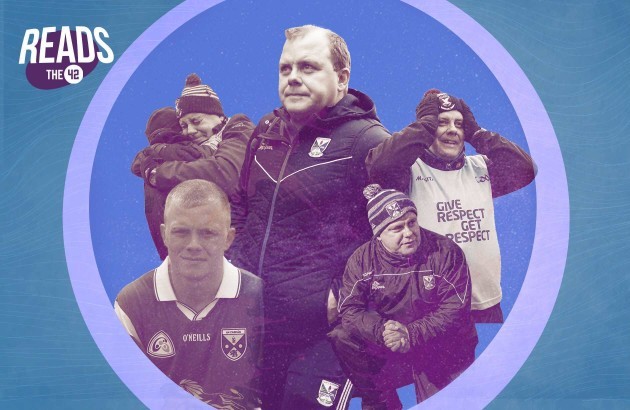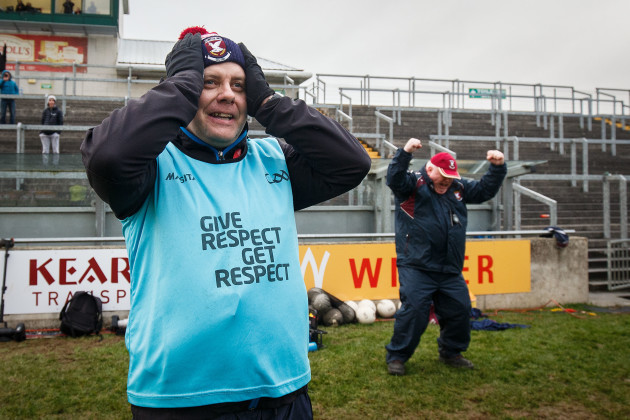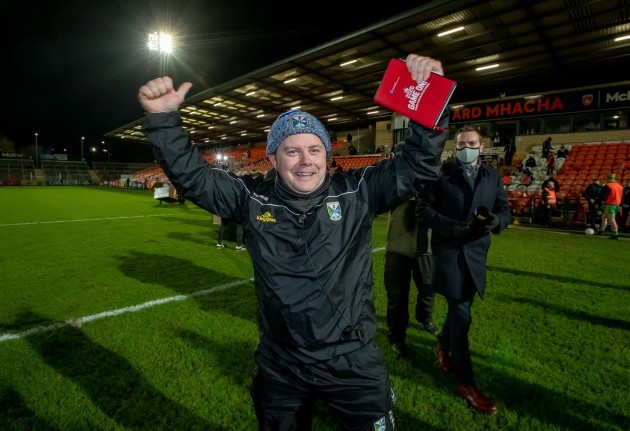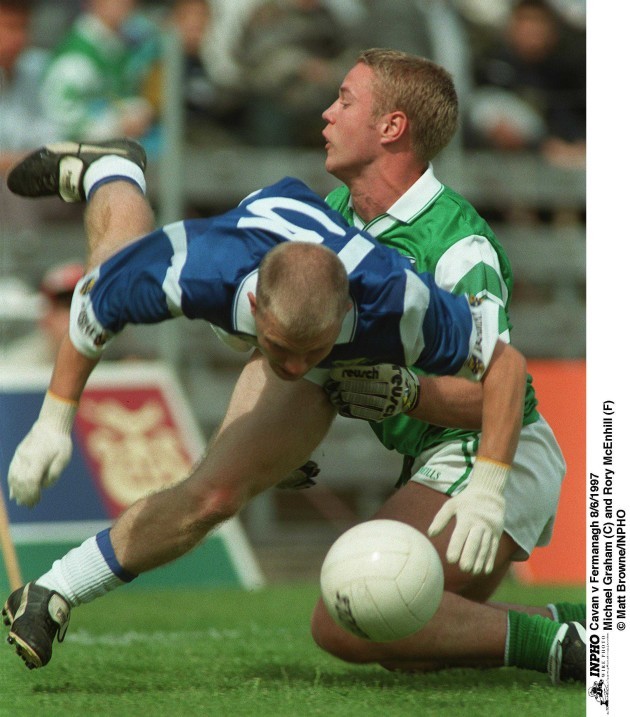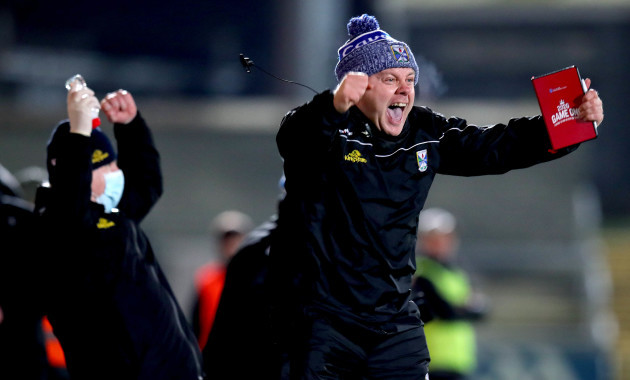DURING HIS DAYS at the helm with Mullinalaghta, Mickey Graham had a team selection headache with his selectors ahead of a county final.
The Cavan native would end his time with the north Longford side as three-in-a-row county champions as well as becoming kings of Leinster in 2018. In short, he masterminded one of the greatest success stories in GAA club history.
But on this occasion, there was some disagreement about one position in the line-up with county honours on the line. His selectors Paddy Brady and John Denning were arguing the case for one player while Graham wanted to go another way.
They tried to figure it out at a meeting on the day of a training session, and when that didn’t resolve their differences, they agreed to head to training early that evening and make a final decision.
Brady, who remains good friends with Graham to this day, takes up the story.
“The next thing Mickey said, ‘Fuck it, it’s 8.15, these lads are out on the field waiting on me.’ And he says, ‘Go on, ye do it.’ And he walked, and we discussed it.
“And the fact that we were [for] one lad, we wrote his name on the teamsheet. And I handed him [Graham] the teamsheet on the way back into the dressing room, and he called it out. And I was watching him closely as he came to this particular guy.
“Now you’d swear he was his first choice on the team and I thought, ‘Well fair fecks to ya man.’ Now we’d often disagree on positions or whatever. You’d say your reason and he’d say his and we’d work it out.
“He’s always willing to learn and listen.”
*****
Prior to Graham’s arrival at the half-parish, Mullinalaghta had gone 66 years without a senior county title. They had also lost the 2014 county final.
But between 2016 and 2018, Mullinalaghta were at the summit in Longford.
Brady is a Mullinalaghta man whose son Conan was on the team that delivered the 2018 provincial title.
He had been dipping in and out of coaching roles with the club for years, and had a conversation with the club chairman John Keegan in the wake of their 2014 county final defeat that brought him into the senior set-up two years later.
Brady felt their formation could have been better on the day, and Keegan didn’t forget what he said.
- For more great storytelling and analysis from our award-winning journalists, join the club at The42 Membership today. Click here to find out more >
“John spoke to me in ’16 and said, ‘Are you willing to put your money where your mouth is?’” Brady laughs remembering the moment that kickstarted the journey.
With no modern tradition of winning senior championships in Mullinalaghta, belief was thin on the ground. The experience of reaching the 2014 final gave them an impetus to strive for the next hurdle, but they were missing something.
And when Graham was appointed as manager in 2016, he came with an understanding of the club football landscape in Longford having previously managed the Clonguish club.
He had an easy manner too which made an immediate impact on the group.
“I remember watching the first session,” says Brady.
“Like any manager, it takes lads a while to get accustomed to him but the one thing I can remember is the laughter and the boys enjoying it. I was chatting [to] the lads after and the key thing was, there was no time wasted between drills. He kept them all going.
“As the years went on, it got quicker actually and we had so many seconds to get from drill A to drill B. He had them fit and he did a lot of the training himself, but if he thought it was stagnant at all, he’d bring in somebody for something different.
“Anything he’d see that Mickey thought would be an addition, he’d incorporate it in his drills, which to me is a great sign of a person. No matter what you’re at, you can always learn from anybody.
“And he would have the craic with them. I’ve seen him umpteen times standing in the dressing room chatting and the lads would be in getting changed. He’d say, ‘God it’s very quiet in there.’ He’d go in and stir the whole thing and come out laughing. Next thing you’d hear the craic inside.
“And then they’d go out onto the pitch and they were like first year kids. He could command their attention when he was training them. But he was also part of the unit when the craic was on. He had this serious ability to do it. He was like a good teacher and the pupils always stop and ask questions with him.”
Graham’s taste for mischief could well be traced back to his youth when he was christened with the nickname ‘Big S.’ The ‘S’ in the title stands for ‘shit-stirrer.’
His former Cavan team-mate Jason Reilly remembers seeing why Graham earned that reputation in the days when they shared a dressing-room together. The pair were on the Cavan squad that won the Ulster SFC in 1997; both making appearances in the second half of the provincial decider against Derry.
It was Reilly who scored a decisive goal that day to swing the tie for Cavan before putting his shirt over his head to commemorate the celebration that was made famous by former Juventus and Middlesbrough player, Fabrizio Ravanelli.
That celebration wasn’t an instinctive reaction on Reilly’s part, rather it was a pact that he made with Graham if a goal chance was presented to either of them in the game.
“We mentioned it a few times and it could have happened [to] either one of us. He could have come on and scored either. I suppose morale that time was on a high. We were young fellas coming in after winning an Ulster U21 and beaten in the All-Ireland as well, so we thought this was going to happen every year.”
But we digress. Back to the origins of ‘Big S’.
Reilly lays it on thinly with the details, but offers snippets of how Graham came to be known as a trickster.
“It started long before I ever knew him, he was always called ‘Big S: the shit-stirrer.’ Around that time, he’d be messing with fellas and telling them there was a phonecall for them for an interview.
“A few boys were caught when he said he was from The Star. The boys’d be talking away to him. That’d be him alright.”
There’s traces of that trait in Graham the manager too. This writer encountered it in the days before last year’s Ulster SFC final against Donegal, Graham’s second provincial decider as manager of the Cavan team.
Over a lengthy zoom call with the press, Graham subtly put the spotlight on the reigning champions. He suggested that bigger teams like Donegal get the important refereeing decisions during games, and that those heavyweight sides are better equipped at influencing the flow of games.
One quote stood out from Graham’s address:
“We’re probably a bit naive down here in Cavan because we haven’t been dining at the top table for a long time. We need to get a wee bit cuter down here.”
What followed that weekend was a spirited display from Cavan that shocked the neutrals and rattled Declan Bonner’s side to take the throne for the first time since the heroics of 1997.
“He’s not called ‘Big S’ for nothing,” Reilly replies when that recent interaction between Graham and the media is put to him.
Similarly, current London selector Lorcan Mulvey can recall Graham’s brand of humour when he was in charge of the Butlersbridge team that captured the Cavan junior title in 2004.
Mulvey was a teenager when Graham came on board, but was naturally aware of his stock in football after the Ulster success from seven years earlier.
Brady has already told us how Graham brought versatility and fun to Mullinalaghta’s training sessions. And the players at Butlersbridge were exposed to similar coaching practices.
“He was a fresh young manager with new ideas and drills,” says Mulvey, who went on to become London’s first football All-Star nominee in 2013.
“He wasn’t your monotonous same-drills-every-week [manager]. He was probably the first of the new era of manager that understood loads on players and their needs and having a rest here and there.
“And mixing up the drills and working on specific things and having a bit of craic in training too.
“Mickey’s a bit of a character in fairness to him. He doesn’t go above the parapet too often. He’s quite a clever little man. He knows how to deal, a good people person. He probably knows how people’s buttons are pushed and steers people in different directions. I think that’s his greatest strength.
“I think Mickey’s psychological skills are widely underestimated. Probably a little bit less now that he’s gained success at county level, people are opening their eyes to him a little bit.
“Mickey’s always playing games, he knows exactly what he has in his own pocket [and] what his teams are capable of. I think he protects them very well. I can well imagine he knew exactly what he wanted to say to [the media] before the Donegal game, and he would have had a little game plan up his sleeve.”
****
Those who have reached the pinnacle in club GAA often remark that winning the county championship is the hardest stage of the campaign. Mullinalaghta’s players would support that statement, according to Brady.
The 66-year wait was certainly a factor in breaking through the county barrier. Squad numbers were an issue too, which is no surprise given that they have a population of about 400 people. Brady notes that they used 17 players from the first round of their 2018 championship right up to their All-Ireland semi-final defeat against Kerry’s Dr Crokes.
That makes a stark contrast with the Kilmacud Crokes outfit they faced in the 2018 Leinster final and the membership of almost 5,000 people which they posses.
Mullinalaghta also had the added problem of facing the same opposition in every one of their three-in-a-row final victories.
The Abbeylara club came agonisingly close to disrupting Mullinalaghta’s winning run, particularly in 2018 when they played out a 0-6 apiece draw in horrible conditions. Mullinalaghta were the winners in the replay.
Incidentally, his Butlersbridge adventure culminated in a replay at the county final stage as well, with Graham’s charges eventually winning out by a margin of five points against Redhills.
“He has this serious ability to get the best out of everybody,” says Brady. “He did the same with Cavan and I could see it. He creates a unit based on individual strengths.
“It’s as if he makes each lad feel responsible. We had it here in Mullinalaghta. We had about 18 fairly good footballers, big strong athletic lads who were all committed.
“They wouldn’t miss training because they didn’t want to let each other down. Mickey instilled this and made them enjoy training. His idea was it’s an amateur game and fellas are putting serious efforts in, driving from Dublin or wherever. But if they’re not getting enjoyment out of it, they’re not going to be successful.”
Brady adds that there was no drinking ban in place while Graham was in charge, and major victories were marked by “a big blowout” where the only rule was that everyone was required to go to the same pub.
Creating a fun atmosphere appears to be a big cornerstone of Graham’s management style, but there’s empathy in his approach too. Mulvey says that Graham wasn’t averse to the idea of allowing players to take a rest in Butlersbridge.
“If a man needed a day off, he’d give him the day off,” he says, acknowledging how Graham symbolised a departure from archaic approaches to management.
Ultimately, Graham appreciates the human behind the player.
“If he thought you were doing an exam or your Dad was sick, he’d ring ya to see how you are,” says Brady. “He wouldn’t mention football. And the lads respected that. And when he gets that respect from them, they’d be dying on the pitch for him.
“I often think he’d make a fantastic psychologist. He’s a lovely man to talk to.
“Mullinalaghta and Cavan had no superstars but he gels this unit that’s quite difficult to break down and beat. We found it up here umpteen times. Let’s say the opposition would hone in one of our players, somebody else would step up to the mark and be a leader.
“Mickey had all that instilled into them.”
Graham knows how to read the game too. He’s fluent in it. Graham began perfecting that while playing as a forward for Cavan and his club Cavan Gaels.
Reilly says he wasn’t surprised to see his old friend go down the management road, having seen up close how he could interpret plays on the pitch.
“He was a very smart player. He was small in stature but had the speed to get away. He was just a smart footballer. He knew when to go when not to go, when to contest when not to contest.
“A lot of quickness to him and mad fit as well. You’d find it hard to keep up with him at training in fairness.
“He definitely was a good trainer. Between the two of us, we didn’t miss many trainings. You could count on one hand how many we missed.”
Graham’s intuitive understanding of the game and his vision for how it should be played has evolved even more since putting on the bainisteoir bib.
Brady remembers how the former Mullinalaghta manager would arrive to training with the entire session planned out “in a little book”. Each session would last no longer than one hour and 10 minutes.
Graham could, according to Brady, identify important things in games that others wouldn’t notice until getting a second look on a DVD.
His players had the freedom to move freely on the pitch to confuse the opposition, and an eye was always kept on what other managers were doing in training.
“We’d often stand watching other trainers and think, ‘Oh I must incorporate that,’” says Brady. “He’d a great phrase himself, ‘Every day’s a school day.’ No matter who it was, he’d stand watching a junior match. And that all came from his love of football.
“It’s not for his love of money. If it was, he wouldn’t be in Mullinalaghta.”
****
That affection Graham has for football is reflected in the workload he takes on while managing teams. His stint with Butlersbridge crossed over with his playing career, and he had one particularly hectic day in late 2004 where he managed and played in back-to-back games.
He started off the day patrolling the sidelines for Butlersbridge before whipping on the boots and shorts to line out for Cavan Gaels in an Ulster Club SFC quarter-final against Magheracloone. Graham was victorious on both counts.
He repeated the trick at the start of the 2019 season when he took over the Cavan seniors while still in charge of Mullinalaghta.
“I can’t remember specifics alright but he was a busy boy,” Mulvey recalls about that day when Graham double-jobbed between Butlersbridge and Cavan Gaels.
“Even if he’s not managing or fully involved in teams, you will always see him watching a lot of football, attending a lot of other games. He has a great interest in football and dedicates most of his time and life to it. He’s obviously learned a lot over his couple of decades watching it.
“He was always a very cute footballer when he was playing. He didn’t have the raw speed and height but he was very clever and always was able to tell the rest of the forwards what they should be doing when he was in the corner.
“There was never any doubt about how clever he was on the football pitch and now off it I suppose.”
Graham has continued his winning streak since taking over the Cavan seniors, securing the Ulster title in only his second year in charge. With all the silverware already achieved under his command, he now boasts one of the most impressive managerial CVs in the GAA.
It was an unusual occasion for Cavan fans watching their county end a 23-year wait for provincial success on TV. The celebrations were muted too unfortunately. Instead of a homecoming, the county could only pile into cars and wave flags out the window in honour of their Breffni heroes.
Their championship journey ended at the hands of Dublin in the All-Ireland semi-final but their incredible campaign has also resulted in seven All-Star nominations.
Ollie Brady [1978] and Dermot McCabe [1997] are Cavan’s two All-Star recipients to date, and the county is well poised to pick up another honour at the 2020 awards show this Saturday on RTÉ.
Mickey Graham is the mastermind behind it all, and there is certainly more success to come down the road from him.
“We have this great saying here,” Brady notes, “‘If you’re within two scores and 10 minutes to go.’ We knew we had the fitness and we knew we had a strong physical team. And we knew if we were within two scores and 10 minutes to go, we’d be there or thereabouts.
“I can tell you, the morning of the Ulster final, the text I sent him was, ‘Within two scores and 10 minutes to go.’ And of course that was the way they were. They were like men possessed in that final. Every man went for the ball and every man did what he needed to do.
“It was the same old craic again, he makes each fella feel responsible for his part of the unit. And it works.”
- For more great storytelling and analysis from our award-winning journalists, join the club at The42 Membership today. Click here to find out more >
